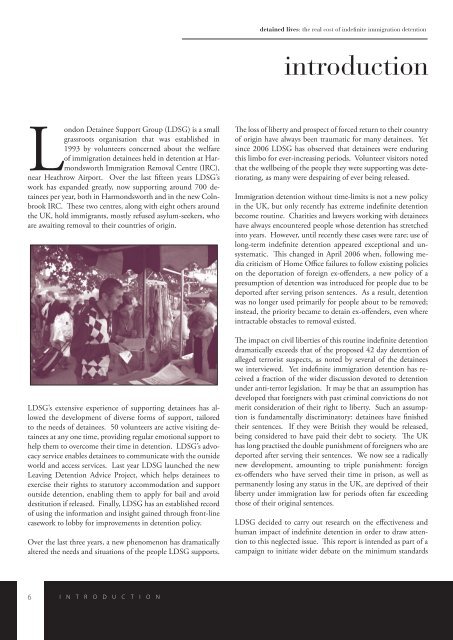Detained-Lives-report1
Detained-Lives-report1
Detained-Lives-report1
You also want an ePaper? Increase the reach of your titles
YUMPU automatically turns print PDFs into web optimized ePapers that Google loves.
detained lives: the real cost of indefinite immigration detention<br />
introduction<br />
London Detainee Support Group (LDSG) is a small<br />
grassroots organisation that was established in<br />
1993 by volunteers concerned about the welfare<br />
of immigration detainees held in detention at Harmondsworth<br />
Immigration Removal Centre (IRC),<br />
near Heathrow Airport. Over the last fifteen years LDSG’s<br />
work has expanded greatly, now supporting around 700 detainees<br />
per year, both in Harmondsworth and in the new Colnbrook<br />
IRC. These two centres, along with eight others around<br />
the UK, hold immigrants, mostly refused asylum-seekers, who<br />
are awaiting removal to their countries of origin.<br />
LDSG’s extensive experience of supporting detainees has allowed<br />
the development of diverse forms of support, tailored<br />
to the needs of detainees. 50 volunteers are active visiting detainees<br />
at any one time, providing regular emotional support to<br />
help them to overcome their time in detention. LDSG’s advocacy<br />
service enables detainees to communicate with the outside<br />
world and access services. Last year LDSG launched the new<br />
Leaving Detention Advice Project, which helps detainees to<br />
exercise their rights to statutory accommodation and support<br />
outside detention, enabling them to apply for bail and avoid<br />
destitution if released. Finally, LDSG has an established record<br />
of using the information and insight gained through front-line<br />
casework to lobby for improvements in detention policy.<br />
Over the last three years, a new phenomenon has dramatically<br />
altered the needs and situations of the people LDSG supports.<br />
The loss of liberty and prospect of forced return to their country<br />
of origin have always been traumatic for many detainees. Yet<br />
since 2006 LDSG has observed that detainees were enduring<br />
this limbo for ever-increasing periods. Volunteer visitors noted<br />
that the wellbeing of the people they were supporting was deteriorating,<br />
as many were despairing of ever being released.<br />
Immigration detention without time-limits is not a new policy<br />
in the UK, but only recently has extreme indefinite detention<br />
become routine. Charities and lawyers working with detainees<br />
have always encountered people whose detention has stretched<br />
into years. However, until recently these cases were rare; use of<br />
long-term indefinite detention appeared exceptional and unsystematic.<br />
This changed in April 2006 when, following media<br />
criticism of Home Office failures to follow existing policies<br />
on the deportation of foreign ex-offenders, a new policy of a<br />
presumption of detention was introduced for people due to be<br />
deported after serving prison sentences. As a result, detention<br />
was no longer used primarily for people about to be removed;<br />
instead, the priority became to detain ex-offenders, even where<br />
intractable obstacles to removal existed.<br />
The impact on civil liberties of this routine indefinite detention<br />
dramatically exceeds that of the proposed 42 day detention of<br />
alleged terrorist suspects, as noted by several of the detainees<br />
we interviewed. Yet indefinite immigration detention has received<br />
a fraction of the wider discussion devoted to detention<br />
under anti-terror legislation. It may be that an assumption has<br />
developed that foreigners with past criminal convictions do not<br />
merit consideration of their right to liberty. Such an assumption<br />
is fundamentally discriminatory: detainees have finished<br />
their sentences. If they were British they would be released,<br />
being considered to have paid their debt to society. The UK<br />
has long practised the double punishment of foreigners who are<br />
deported after serving their sentences. We now see a radically<br />
new development, amounting to triple punishment: foreign<br />
ex-offenders who have served their time in prison, as well as<br />
permanently losing any status in the UK, are deprived of their<br />
liberty under immigration law for periods often far exceeding<br />
those of their original sentences.<br />
LDSG decided to carry out research on the effectiveness and<br />
human impact of indefinite detention in order to draw attention<br />
to this neglected issue. This report is intended as part of a<br />
campaign to initiate wider debate on the minimum standards<br />
6<br />
i n t r o d u c t i o n


